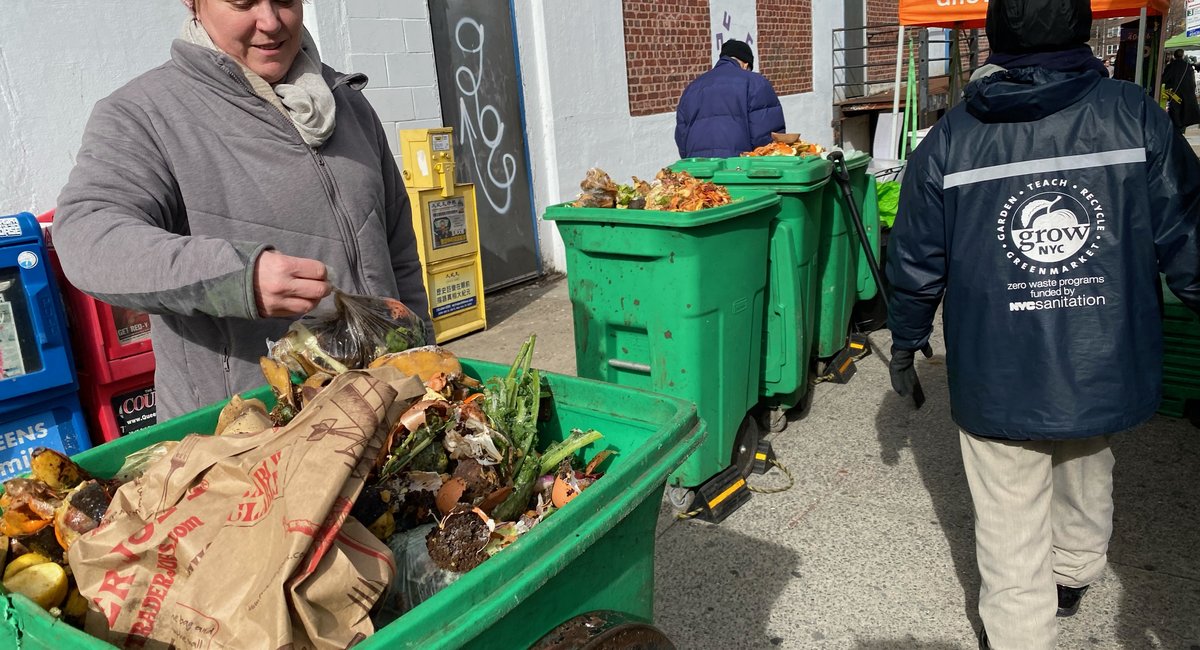New Yorkers will soon lose compost collection sites at the city’s greenmarkets as a result of Mayor Eric Adams’ budget cuts, employees of the nonprofit GrowNYC said on Wednesday.
At a rally outside City Hall, staff from the organization — which runs food scrap collection tents at more than 50 farmer’s markets and farm stands around the city — said that all 53 of GrowNYC’s composting employees expect to be laid off by Dec. 18.
That means the orange GrowNYC composting tents that are a familiar sight at markets citywide will make their last appearances from Dec. 13-17, according Nick Rolf, one of the group’s directors.
The cuts, which Adams announced last month, have forced the sanitation department to slash its $1.87 billion annual budget by 5%, including $3 million allocated this fiscal year for organizations like GrowNYC and Big Reuse to run community composting programs. Advocates said the cuts will lead to the loss of more than 100 jobs across all the organizations affected.
“Losing your job is devastating any time of year. But to think that the week before the holidays, we’re all going to be unemployed, it’s just unfathomable and unacceptable,” said Lena Frey, a GrowNYC compost coordinator who has worked at the McCarren Park greenmarket for more than three years. GrowNYC’s management did not comment on the layoffs.
The mayor last month said the budget cuts were necessary because the city expects to spend $6 billion on care for migrants over the next two years.
Joshua Goodman, a sanitation department spokesperson, said the funding cuts represent about 10% of the city’s total compost budget. In a statement, he said that the department’s universal curbside collection program will reduce the need for community compost programs, which he said are only used by the “truest of true believers.”
The hit to the compost programs undermines the city’s goals of tackling climate change, said Justin Green, executive director of Big Reuse.
“Community composting is the most climate friendly – it makes the best use of the food scraps and the yard waste we compost by putting it right back into the community,” Green said.
His organization runs three sites in Brooklyn and Queens where 2.2 millions of pounds of food scraps and yard waste are turned into more than 1,000 cubic yards of finished compost every year. The compost is redistributed to the parks department and more than 250 community groups and gardens, Green said.
The budget cuts also mean an end to the compost distribution and training resources that Big Reuse has offered community gardens in low-income areas like the Red Hook Farms, he said.
There, harvests of fresh herbs and vegetables help feed more than 2,000 residents of the nearby Red Hook Houses, a NYCHA development. The farm staff trains neighborhood residents on gardening and composting techniques with help from the experts at Big Reuse.
“We are an organic farm,” said Saara Nafici, Red Hook Farms’ director. “Without healthy soil, you’re not going to have a robust harvest. And the community relies on us to have really delicious, nutritious, abundant produce, and we need compost to grow that.”
Big Reuse’s community composting program works with more than 200 community gardens and organizations like Red Hook Farms all over the five boroughs, and takes in the parks department’s leaves and yard waste.
The budget cuts come as the city rolls out curbside collection of organic waste across the five boroughs. The Bronx and Staten Island were slated to start service in the spring but the sanitation department’s budget cuts postponed their launch dates to the fall of 2024.
Some people say they have no choice but to use the community compost sites. Tati Esposito, 29, who dropped off a bag of food scraps at the GrowNYC compost stand in Prospect Park last Saturday, said her Prospect Heights apartment building doesn’t have a compost setup. She said she went to the community compost site because the organic scrap bins set up by the city in her neighborhood were all full.
“That only makes me more pissed off about Adams cutting the funding for these particular programs,” Esposito said of the impending closure of the GrowNYC compost stand.
The city currently processes most of its organic waste at the Newtown Creek wastewater plant in Brooklyn, where it’s turned into slurry that produces biogas. A much-touted project to capture the biogas for the National Grid heating supply ran into problems months after it launched last summer.
The sanitation department also has a composting facility in Fresh Kills on Staten Island, where it processes about 150 million pounds of organic waste per year into finished compost, said Goodman, the department spokesperson. The city plans to increase the capacity to almost 210 million pounds per year “in the near future,” and expand its free compost distribution to residents and organizations that run community gardens, he said.
Frey, the GrowNYC compost coordinator, said the impending layoffs come just months after GrowNYC employees were certified as a union, a rarity in the world of greenmarkets.
Frey was planning a career in urban sustainability, and said the loss of her job will be “devastating” for her plans.
“The entire community composting industry is being decimated here,” Frey said. “So I can’t get another job doing something similar that I care about and my experience is relevant for, because those jobs no longer exist.”

Leave a Reply